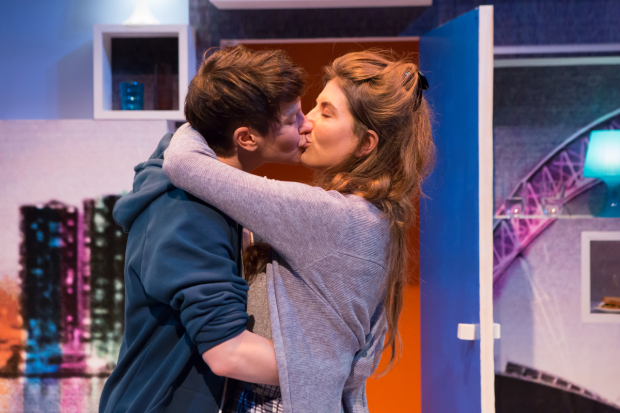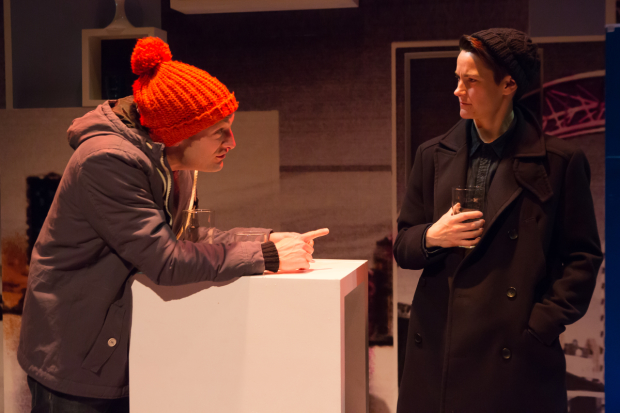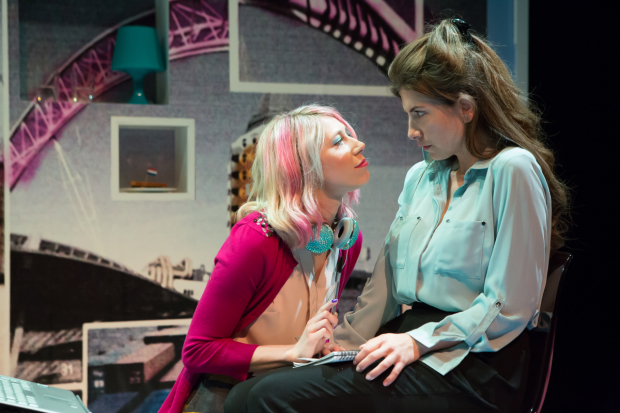Rotterdam

(© Hunter Canning)
Rotterdam, a play by Jon Brittain at 59E59 Theaters, starts as soon as you walk into the theater. A character sits onstage, laptop in lap, alternately typing and staring pensively ahead. Others come and go — a shirtless man walks out of a set door and applies deodorant, followed by a young woman who puts on lipstick as though she were Georges Seurat finishing the hat. All the while, dance pop throbs through the speakers, loud enough that you can feel it in the back of your seat. Not a word has been spoken, but this prelude, with its blend of thoughtfulness and fun, has the audience primed for the rest of the show.
The first character to speak is Alice, the one typing. She’s living in Rotterdam with her girlfriend, Fiona, and finishing up a coming-out e-mail to her parents in England. At least, she thought she was finishing, but then Fiona reveals that he identifies as a man. Things were complicated enough already: Alice moved to Rotterdam seven years ago with her boyfriend Josh, Fiona’s brother, but left him because she realized she liked girls. What happens now that her girlfriend wants to be her boyfriend? And what about Fiona, soon to be Adrian? Now he too has to come out to his parents, but as a transgender man.

(© Hunter Canning)
Thankfully, Rotterdam's director, Donnacadh O'Briain, knows how to honor these characters’ complications without getting bogged down in them. Key to his technique is music. With the help of composer and sound designer extraordinaire Keegan Curran, he layers the play with European synth-pop, especially Robyn. Songs shape the action not in the manner of musical theater, where characters sing their thoughts and feelings, but cinematically, with music playing in the background. In one stomach-churning sequence, Adrian, re-feminizing himself to win back the alienated Alice, rips off his breast binder and jams on high heels and lipstick to the up-tempo but downbeat tune of "Dancing on My Own."
The dialogue sings too, though often dissonantly. Alice and Fiona spend most of their time fighting, first over Alice taking years to come out to her parents, then over what Fiona's transition means for their relationship, and on and on. Nor is their fighting limited to each other. Fiona, after starting her transition, argues with Josh about the importance of others seeing him (Adrian) as he wants to be seen. Alice, whose relationship problems propel her into a flirtatious friendship with her Dutch coworker Lelani, squabbles with Lelani about Holland and her own uptightness. The stichomythic spats are often funny — explaining the effects of hormone therapy to Alice, Adrian says, "My periods would stop, so our bad moods wouldn’t be in sync anymore" — but between the wit and the malice, the love gets lost. Its disappearance is a problem not least because the play's final scene depends on its survival.

(© Hunter Canning)
The actor playing Alice, Alice McCarthy, is a performer of such versatility that she manages to sometimes surface her character's love along with her anger. As Fiona/Adrian, Anna Martine Freeman lacks McCarthy's nuance but has enough passion to make her character seem real — and really anguished. Ed Eales-White also impresses as the bluntly speaking, well-meaning Josh. Though Ellie Morris' Lelani lapses into artificiality, she gets across the femininity and foreignness (to Alice's eye) that allure Alice and make the attraction between them plausible.
What matters most about this show isn't the excellence of its constituent parts, though. It's what they create when combined. The punch of the script, together with the fierce acting and unifying direction, make for a living, aching portrait of a trans man and a transitioning relationship. And what relationship — romantic, at least — isn't always transitioning? Not to downplay the difficulties facing Alice and Adrian — after all, few people have to rethink their sexual identity because of a change in their partner's gender identity. But the triumph of Rotterdam is the triumph of all great theater: It finds its way to the universal through the personal.











